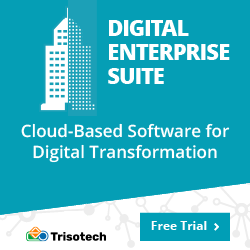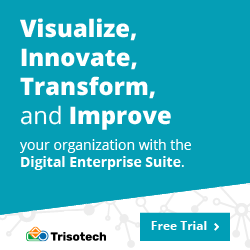Help #SME becoming #digital
Description
Help Small and Medium Enterprises becoming #digital
Transcript
Help SME becoming #digital
Alexander SAMARIN
SME – Small and Medium Enterprise
• The realities of the new world:
– speed – immediately
– scale – planet-wide
– variations – more opportunities in more locations with more
partners and for more customers
– competition – with everyone (any may be attacked by everyone)
– transparency – be ready to justify everything
• Only the digital (neither physical nor analogue) media can
handle this unprecedented complexity
• Digital relates to everything:
– products, production, design, organisation of work, customer
experience, compliance, security, etc.
© A. Samarin 2015 Help SME becoming #digital v1 2
Why becoming digital?
• Business artefacts are available in digital formats (formal and executable)
• Business artefacts can be moved between digital, analog and physical medias
• Digital is the master media for business artefacts
• Everyone “understands” the digital formats for business
• Enterprise can transmit, protect, validate, enrich, interpret and manipulate
digital business artefacts at their whole life-cycle
• Enterprise can generate new knowledge from digital business artefacts
• Enterprise knows all the dependencies between its digital business artefacts
• Enterprise can adapt digital business artefacts for a particular customer
• People can delegate to “things” some routine activities with their artefacts
• With the progress of #IoT, “things” become more capable actors within digital
business processes
© A. Samarin 2015 Help SME becoming #digital v1 3
#digital manifesto
• Weak enterprise-wide units
• Lack of free resources & Lack of internal expertise
• Many modern technologies and tools on the market
• In addition to “faster, cheaper, better” is it mandatory to
become digital, ecological and societal
• Licences, consultants and external development are very
expensive
• In-house development is very slow
• Improbable to start big and risky projects
• A lot of legacy
© A. Samarin 2015 Help SME becoming #digital v1 4
Barriers in SME to become #digital
• Which business artefact is the most important one for
becoming #digital?
– products
– services
– capabilities
– functions
– organisation units
– information
– processes
– something else
• Hint: try to derive from your choice all other artefacts
© A. Samarin 2015 Help SME becoming #digital v1 5
Use the points of most leverage to
enable such a transformation
• a model and communication tool during the design
period
• input for project evaluation (including impact analysis)
• input for project planning and execution
• an executable program for the coordination of work
• documentation for all staff members
• a “single source of truth” for operating control and
monitoring
• a framework for internal control and security
enhancement
• the basis for management decisions
© A. Samarin 2015 Help SME becoming #digital v1 6
Properly done, a business process
serves many purposes
• The goal – how to climb up with the pace of business and
without drastically changing diagrams, tools, practices and
architecture
Ladder of business process practices
© A. Samarin 2015 Help SME becoming #digital v1 7
Implicit
Illustrative
Explicit
Executable
System-of-processes
Fully digital
Everyone understands common
business processes in the same way
If there are separation of labour or
separation of work then there are
business processes
Each person understands common
business processes differently
Coordination via business
processes is carried out objectively
Enterprise is a system-of-processes
All business artefacts are digital-
first
• Business processes are described somewhere long time
ago
• Business processes are embedded into applications
• People understand business processes differently
• Example: To “push” forward a process instance (e.g. my
request for procurement), one has to know
– what is the current activity
– who is doing this activity now
– be a friend with this person
– call him/her, re-explain all details and re-send several documents
• Different units see end-to-end processes differently
© A. Samarin 2015 Help SME becoming #digital v1 8
Implicit business processes
© A. Samarin 2015 Help SME becoming #digital v1 9
Illustrative are not enough …..
Usage of business processes Illustrative model
As a communication tool Informal
Input for project planning and
execution
Expert agreed guess
Coordination of work Subject to personal interpretations
Corporate knowledge Usually disconnected from the
reality
Source for operating control Post factum
Framework for internal control Based on willingness
Framework for information
security
Usually not connected
Basis for management decisions Subjective and delayed
• Essential
techniques:
– common notation
– hierarchy of
processes
• Essential concerns:
– Are process
diagrams
understandable
for everyone?
– Quickly
understandable?
• Qualitative technique to demonstrate business advantages
• Use of BPM-suite tools to demonstrate IT advantages
• Example of a quick consultancy
– Concern: faster + cheaper + better delivery of business solutions
– Task: demonstrate agility in prototyping, integration and evolutions
– Action: use 4 various tools (BPM-suite) to prototype
– Result: BPM was accepted to modernise an in-house ERP
© A. Samarin 2015 Help SME becoming #digital v1 10
How to justify to become better then
illustrative processes?
• Essential
techniques:
– modern
modelling
practices
– process
patterns
– simulation
© A. Samarin 2015 Help SME becoming #digital v1 11
Why explicit?
Usage of business processes Explicit model
As a communication tool Semi-formal
Input for project planning and
execution
Expert agreed about SOA
Coordination of work Commonly agreed and subject
to personal interpretations
Documentation for staff What we see is what you we
should do
Source for operating control Post factum
Framework for internal control Based on willingness
Framework for information security Usually not connected
Basis for management decisions Subjective and delayed
• Incremental transformation to #digital (explicit and
executable) processes – see http://improving-bpm-
systems.blogspot.com/2015/06/incremental-
transformation-to-digital.html
• BPM and BPMN training courses
• Proven process modelling procedure
• Many practical process patterns
© A. Samarin 2015 Help SME becoming #digital v1 12
How to advance to explicit business
processes?
© A. Samarin 2015 Help SME becoming #digital v1 13
Why executable?
Usage of business processes Executable model
As a communication tool Formal
Input for project planning and
execution
SOA ready – services and other
artefacts
Coordination of work Commonly agreed and
objectively re-inforced
Documentation for staff What we see is what you we
must do
Source for operating control Objective and immediate
Framework for internal control Based on obligations
Framework for information security Dynamic and proactive
Basis for management decisions Objective and immediate
• Essential
techniques:
– BPM reference
model
– BPM suite
– automation
– optimisation
loop
• Quantitative technique to demonstrate the effect of
automation
• BPM-suite tool selection for your needs
• Proven implementation practices, BPM COE, knowledge
transfer, rapid prototyping
• An example
© A. Samarin 2015 Help SME becoming #digital v1 14
How to advance to executable business
processes?
• See http://improving-bpm-
systems.blogspot.ch/2014/03/enterprise-as-system-of-
processes.html
• Five levels of coordination with the system-of-processes
1. business activities
2. process fragments / patterns
3. classic business processes (workflows)
4. cluster of business processes (around functional processes)
5. value-streams (or end-to-end business processes)
© A. Samarin 2015 Help SME becoming #digital v1 15
Why system of processes
• Manage life-cycle of all enterprise artefacts
• Transform process improvement into business
improvement (BPM is already 50 % of EA)
• SOA/ESB/API and microservices-based application
architecture – see http://improving-bpm-
systems.blogspot.ch/2015/04/architecting-cloud-friendly-
application.html
© A. Samarin 2015 Help SME becoming #digital v1 16
How to advance to enterprise-as-a-
system-of-processes?
Many practices become process-
centric:
• Governance
• Project management
• Risk management
• Records management
• ECM and knowledge
management
• Enterprise architecture
© A. Samarin 2015 Help SME becoming #digital v1 17
Iceberg of processes
+Governance as
a process
• Each SME has its own way – for example, –
http://improving-bpm-
systems.blogspot.com/2015/06/an-example-of-
architecting-digital.html
© A. Samarin 2015 Help SME becoming #digital v1 18
How to advance to fully digital?
• Enterprise functioning can be considered as business
activity flows spanning the applications, employees,
customers and partners within and beyond the boundaries
of the enterprise
• Business activity is a unit of work
• Business process is an explicitly-defined coordination
for guiding the purposeful enactment of business activities
– Note: Business process is a plan of work with some variations and
its execution with some necessary corrections
© A. Samarin 2015 Help SME becoming #digital v1 19
Business process definitions
• Enterprise functioning can be considered as business
activity flows spanning the applications, employees,
customers and partners within and beyond the boundaries
of the enterprise
• Business activity is a unit of work
• Business process is an explicitly-defined coordination
for guiding the purposeful enactment of business activities
– Note: Business process is a plan of work with some variations and
its execution with some necessary corrections
© A. Samarin 2015 Help SME becoming #digital v1 20
Business process definitions
• Business Process Management (BPM) is a process-
based management discipline involving any logical
combination of
– modeling/planning,
– automation/implementation,
– execution,
– control,
– measurement and
– optimization
of business processes
– Process-based management discipline is a management
discipline which exploit the concept of “business processes”
– Management discipline is a discipline for the better
management of the enterprise functioning in support of the
enterprise goals
© A. Samarin 2015 Help SME becoming #digital v1 21
BPM definitions
• QUESTIONS?
• Personal website: http://www.samarin.biz
• Blog http://improving-bpm-systems.blogspot.com
• LinkedIn: http://www.linkedin.com/in/alexandersamarin
• E-mail: alexandre.samarine@gmail.com
• Twitter: @samarin
• Mobile: +41 76 573 40 61
• Book: www.samarin.biz/book
Help SME becoming #digital v1 22
Thanks
© A. Samarin 2015
Leave a Comment
You must be logged in to post a comment.







